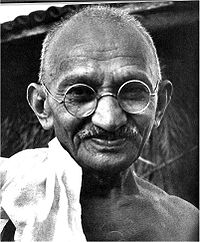Mohandas Gandhi invented the method of "satyagraha." In short, satyagraha is a form of nonviolent protest. Techniques of satyagraha include: civil disobedience, boycotting and hartal (or labor strikes). Many people believe that the American Revolution did not have to happen when it happened. Some people even believe that there did not have to be a war at all. The colonies, in the 1770's, did not have one figurehead to guide them through their rough times, and that is why the revolutionary war exploded so abruptly. Technically, the American citizens were not being overly corrupted by their mother country, Great Britain. In reality, the colonies wanted to be separate from England and wanted to be free due to the rapid spread of Enlightenment ideals. This desire for freedom from the original colonies was inevitable, however the war could have been avoided. If Gandhi lived in colonial America, during the 1770's, and spread his techniques of nonviolent protesting, the war could have been postponed or eliminated completely. The outcomes of all revolutions are greatly determined by the quality of the leaders. If Gandhi was able to unite all of the people in the colonies under one common cause—to gain freedom from Great Britain—the British parliament would have had no choice to give them what they were asking for. Not to mention, if they all did so nonviolently, the British would have been happy to comply with their requests. However, there may have been some difficulties in the colonies with Gandhi’s satyagraha method. Gandhi was able to make his citizens of India look past their religious beliefs and not consider themselves Hindus or Muslims, but Indians. The colonists were, for the most part, united religiously; however, in the colonies, religion was not a monumental thing. The colonists cared about their religions, but they did not discriminate against other religions. Therefore, unlike in India, there were no religious disputes in colonial America. There were other internal disputes, though. Instead of the colonists being segregated by religion, they were separated based on whether or not they considered themselves British. If Gandhi was the leader of colonial America, and succeeded in uniting the colonists against the British, parliament would have seen, through nonviolence, that it was time to let the colonies go.

It's an interesting thought-exercise. It would be useful, in writing your post here, if you could link to the "some people" who think that there didn't have to be a war. Also, I'm not sure if the British would have been happy to comply with their requests. But picking up on the question of unity is an apt comparison.
ReplyDeleteI am writing a paper about the Pre-American Revolution era and analyzing through the lens of a protest movement. I think you are right that in many ways the war signaled the failure of the protest movement, and there been one central leader who had advocated a non-violent approach, the war may have been avoided. Thanks for your insight.
ReplyDelete